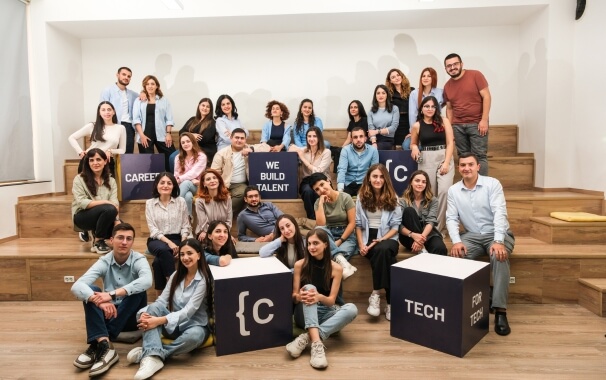My Way Home
21.10.2024
7 min read
Repat Story
Armenian Code Academy: A New Era of Tech Education in Armenia
-webp(85)-o(jpg).webp?token=e071af62b0aef7076fa9043cff0bece6)
Leaving Armenia, Finding a Way Back
I first heard of the protagonist of this story a few years ago. During a call, my mom asked, “Do you know Narek Aslikyan?” I searched his name on Facebook and realized I’d seen him around – once at Ayb’s New Year fair with a classmate, and on social media, promoting IT education in Armenia. Even though I’m not in tech, I’d definitely heard of the Armenian Code Academy, which he founded. But my mom’s question surprised me; she lives in Russia, so how did she know him? It turns out our families were neighbors back in the '90s in Kanakeravan, were friends, and later both moved to Russia.
Years later, we finally got a chance to talk. What started as a warm, Armenian-style conversation about our parents’ friendship turned into an interview where Narek shared his story of life in Russia, moving back to Armenia and founding his academy.
“In 1994, my family moved to Moscow for medical treatment,” he recalls. “We ended up staying for 22 years without really planning it. There wasn’t a strong push to return to Armenia. I didn’t even know what I’d do there. But after I got into Moscow State University and started meeting more Armenians, I began to notice that the efforts of many Armenians in Moscow were focused more on self-satisfaction than on doing something meaningful for Armenia. There was no real bridge between the diaspora and Armenia. And so I thought, could I eventually move back and help build something useful in Armenia?”
For Narek, the idea of returning to Armenia stayed with him. He noticed that in places with a large Armenian community, people tended to stick to their own circles and gradually lost their connection to Armenia.
“Why did I, or many others, leave in the 90s? Those reasons don’t hold up now. Life has improved in Armenia, and in terms of safety, I think Armenians in Russia face more risks now. If everyone who left asked themselves if their reasons for leaving are still valid, they’d probably come back.”
Starting Armenian Code Academy
A year before he moved back, Narek visited Armenia in 2015 and met with an executive from an IT company. As an HR professional, he wanted to understand what corporate life was like in Armenia.
“During our coffee chat, I casually asked if HR professionals were in demand. The answer was no. At first, I thought, ‘Okay, that makes sense. They’re behind in business and don’t need HR.’ But then my contact explained that traditional HR wasn’t needed. Instead, they were looking for talent performance managers, people who could align HR with business goals, develop human potential, and so on. Suddenly, I realized I was having a conversation that felt even more advanced than some I’d had in Russia. Armenia’s IT sector was aligned with the U.S. market and was moving faster than some Russian companies. That’s when it hit me – there was a huge opportunity here, especially in IT, and I could be part of it. IT was sort of a first ‘bubble’ back then – a bubble because IT in Armenia lives its own life, yet it’s open to new people. Recognizing this niche, entering the industry was relatively simple if you knew a few people”.
Narek saw a significant gap between what universities were teaching and what the IT industry needed, so with a partner, he decided to open an educational center focused on international standards and quality. Not everyone could enroll, but every graduate would be a top candidate in the industry.
Armenian Code Academy (ACA) was launched in 2015, and after a year of remote work, Narek finally made the move to Armenia in 2016.
Academy’s Impact on Armenia
“In 2017, we launched the first course in Armenia on machine learning and data science, and universities only started teaching it later. In 2016, we introduced programming courses in Python, and now according to the Ministry of Education’s new strategy, Python is set to be introduced in schools. Back then, very few people specialized in Python, and no one was teaching it. We’ve introduced Product Management, DevOps, Data Engineering and other in-demand courses over the years. There are still gaps, like in product marketing and IT sales, so we study market needs and convince both students and companies that these skills are critical.”
ACA became the first to train data scientists, machine learning specialists, DevOps engineers, Python developers, data engineers, product managers and technical recruiters in Armenia.

In 2015, they had about 15 students; by 2022, they were training 4,000 a year. Over nine years, about 16,000 students have graduated.
Talking about ACA’s impact on Armenia’s economy, Narek says it goes beyond just the money. “Our graduates earn billions of drams, most of which they spend in Armenia. But for me, the bigger impact is how we’re changing the culture around education. Universities are starting to improve, and employers are more willing to hire junior developers, who used to be seen as a burden nine years ago.”
Working with the Ministry of High-Tech
The Armenian Code Academy now partners with the Ministry of High-Tech Industry to run IT workforce retraining programs and professional orientation for kids in Armenia’s regions.
“We want students in remote areas to know that they have options – they don’t have to move to Yerevan or go abroad. If we can give them hope that they can become programmers, marketers, product managers or designers and stay in their hometowns like Yeghegnadzor or Vardenis, then we’re changing the culture not just in Yerevan, but across Armenia.”
The pilot project in Vayots Dzor, Syunik and Gegharkunik reached about 400 kids. ACA is now working on securing a scholarship fund from their donor to support kids who want to keep studying.
The ACA Foundation and New University Plans
Two years ago, ACA started the Technological Education Foundation, registered in Armenia and the U.S. Its mission is to provide scholarships for talented kids who can’t afford tuition.
“In the last five years, we’ve achieved three big goals in Armenia: we made tech education accessible to everyone, popularized digital, computer and financial literacy, and spread it to all regions. For example, with the UN and UNDP, we ran a digital literacy program last year for a thousand women from the regions, mostly teachers, who later even used our materials in their own classes. And, though it’s still in the works, we’re planning to launch a tech university in Armenia, competitive on a regional scale – from Eastern Europe to the Middle East – with English-language master’s programs and partnerships with international companies. We’ve made a lot of progress, and I believe we’ll roll out the first programs next year.”
What Armenia Gave Back

Reflecting on what he personally gained by moving to Armenia, Narek says it taught him valuable lessons about building a business and leading a team. He learned to connect with people, communicate and stay open-minded.
“One more important lesson I learned here was how to play the long game. Focusing only on the short term keeps you chasing immediate gains. But if you commit to doing good work – even without immediate pay – the returns will come. Your business won’t fall apart; instead, you’ll see the lasting impact over time.”
By Nare Bejanyan
-
Repat Story
-webp(85)-o(jpg).webp?token=1e92b54f0944749ca5bfba8610443e65) 11.07.2025Finding Her Best Self: A Journey from Kyiv, Through Artsakh, to Ijevan
11.07.2025Finding Her Best Self: A Journey from Kyiv, Through Artsakh, to Ijevan -
News
-webp(85)-o(png).webp?token=f37ae16e3d39e65dcd2a12f487f7bf27) 24.03.20253 min readFind a job in Armenia more easily with staff.am and Repat Armenia
24.03.20253 min readFind a job in Armenia more easily with staff.am and Repat Armenia -
Repat Story
-webp(85)-o(jpg).webp?token=1288c94320c03ca30a5ed612b072b0db) 22.01.20257 min readConductor Nvart Andreassian: Five Decades of Experience for Armenia
22.01.20257 min readConductor Nvart Andreassian: Five Decades of Experience for Armenia

-webp(85)-o(png).webp?token=b52e9ea1baa1cd28354d961b83f55db1)